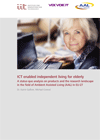
The ratio of old people is rising. Besides labour markets, pensionsystems and social schemes in general, we have to consider healthcare systems to be heavily affected, as an ageing population will lead to a higher ratio of people with disabilities or chronic illnesses. In the case of elderly people in particular, the increase in multi-morbid disease patterns is well known. In the majority of cases, this involves an extensive care effort: first of all with regard to health costs, caused, for example, by the fact that increasing levels of care are required and more medical services, devices, and pharmaceuticals are needed. Thus, healthcare systems and social care in general - which are typically organised on national level and characterised by national differences in their institutional designs – will have to cope with increasing expenses.
Facing the challenges and opportunities of ageing societies in Europe, there are also chances: technological and socioeconomic innovation can enhance the quality of life for older and impaired people, mitigate the economic problems of an ageing population, and create new economic and business opportunities in Europe. It is assumed that new information and communication technologies for elderly people will play an important role in solving some future problems. This assumption constitutes the motivation for the present study.
Download ICT Enabled Independent Living for Elderly (.pdf, 2.616 KB).
Download from eHealthNews.eu Portal's mirror: ICT Enabled Independent Living for Elderly (.pdf, 2.616 KB).
This contribution has been prepared by VDI/VDE Innovation und Technik GmbH. It is a shortened and revised version of the study "ICT enabled independent living for elderly", which has been prepared on behalf of the European Commission, DG Information Society and Media, Directorate ICT for Citizens and Businesses, ICT for Health Unit.